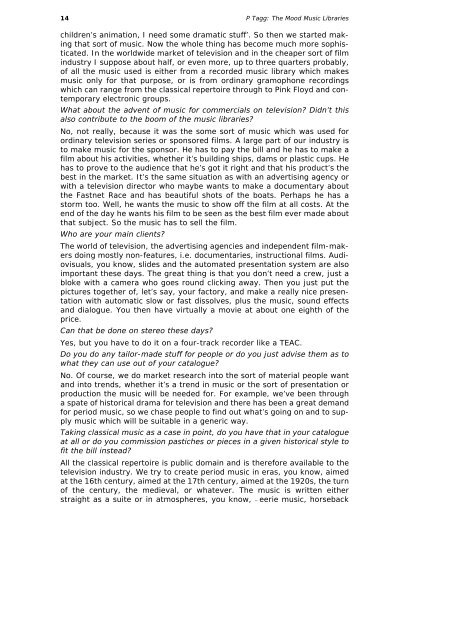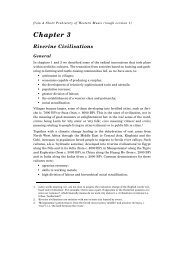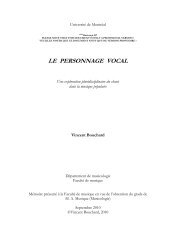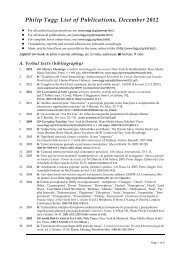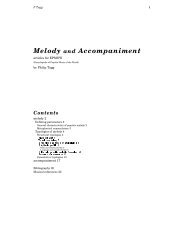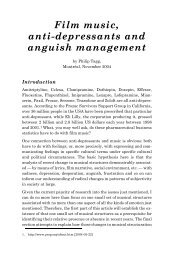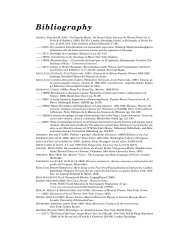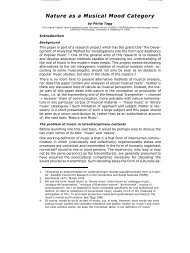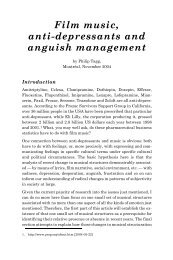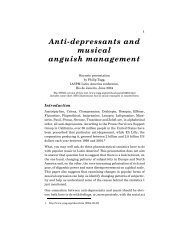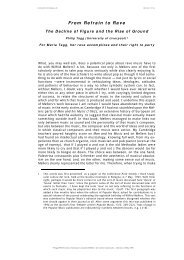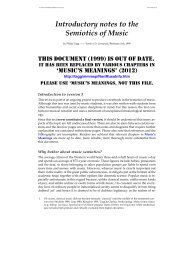interviews with library music producers - Philip Tagg
interviews with library music producers - Philip Tagg
interviews with library music producers - Philip Tagg
Create successful ePaper yourself
Turn your PDF publications into a flip-book with our unique Google optimized e-Paper software.
14 P <strong>Tagg</strong>: The Mood Music Libraries<br />
children’s animation, I need some dramatic stuff’. So then we started making<br />
that sort of <strong>music</strong>. Now the whole thing has become much more sophisticated.<br />
In the worldwide market of television and in the cheaper sort of film<br />
industry I suppose about half, or even more, up to three quarters probably,<br />
of all the <strong>music</strong> used is either from a recorded <strong>music</strong> <strong>library</strong> which makes<br />
<strong>music</strong> only for that purpose, or is from ordinary gramophone recordings<br />
which can range from the classical repertoire through to Pink Floyd and contemporary<br />
electronic groups.<br />
What about the advent of <strong>music</strong> for commercials on television? Didn’t this<br />
also contribute to the boom of the <strong>music</strong> libraries?<br />
No, not really, because it was the some sort of <strong>music</strong> which was used for<br />
ordinary television series or sponsored films. A large part of our industry is<br />
to make <strong>music</strong> for the sponsor. He has to pay the bill and he has to make a<br />
film about his activities, whether it’s building ships, dams or plastic cups. He<br />
has to prove to the audience that he’s got it right and that his product’s the<br />
best in the market. It’s the same situation as <strong>with</strong> an advertising agency or<br />
<strong>with</strong> a television director who maybe wants to make a documentary about<br />
the Fastnet Race and has beautiful shots of the boats. Perhaps he has a<br />
storm too. Well, he wants the <strong>music</strong> to show off the film at all costs. At the<br />
end of the day he wants his film to be seen as the best film ever made about<br />
that subject. So the <strong>music</strong> has to sell the film.<br />
Who are your main clients?<br />
The world of television, the advertising agencies and independent film-makers<br />
doing mostly non-features, i.e. documentaries, instructional films. Audiovisuals,<br />
you know, slides and the automated presentation system are also<br />
important these days. The great thing is that you don’t need a crew, just a<br />
bloke <strong>with</strong> a camera who goes round clicking away. Then you just put the<br />
pictures together of, let’s say, your factory, and make a really nice presentation<br />
<strong>with</strong> automatic slow or fast dissolves, plus the <strong>music</strong>, sound effects<br />
and dialogue. You then have virtually a movie at about one eighth of the<br />
price.<br />
Can that be done on stereo these days?<br />
Yes, but you have to do it on a four-track recorder like a TEAC.<br />
Do you do any tailor-made stuff for people or do you just advise them as to<br />
what they can use out of your catalogue?<br />
No. Of course, we do market research into the sort of material people want<br />
and into trends, whether it’s a trend in <strong>music</strong> or the sort of presentation or<br />
production the <strong>music</strong> will be needed for. For example, we’ve been through<br />
a spate of historical drama for television and there has been a great demand<br />
for period <strong>music</strong>, so we chase people to find out what’s going on and to supply<br />
<strong>music</strong> which will be suitable in a generic way.<br />
Taking classical <strong>music</strong> as a case in point, do you have that in your catalogue<br />
at all or do you commission pastiches or pieces in a given historical style to<br />
fit the bill instead?<br />
All the classical repertoire is public domain and is therefore available to the<br />
television industry. We try to create period <strong>music</strong> in eras, you know, aimed<br />
at the 16th century, aimed at the 17th century, aimed at the 1920s, the turn<br />
of the century, the medieval, or whatever. The <strong>music</strong> is written either<br />
straight as a suite or in atmospheres, you know, ~ eerie <strong>music</strong>, horseback


